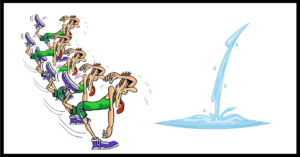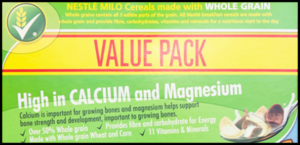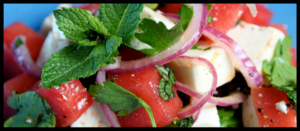
Don’t you just love this time of year? Here in Sydney, we are lucky enough to have summer and Christmas fall at the same time. That means warm sunny days, more time to fit in your exercise in daylight, lots of partying, and not much clothing to hide behind! (I could be thinking about my misspent youth here, but let’s run with it).
[mantra-multi][mantra-column width=”3/4″]

Yes, it’s the silly season, when most of us let go, sometimes just a little too much. Ever wonder how someone’s weight (perhaps yours) manages to creep up on them in a slow ambush until “BANG” one day they are 5-10 kgs heavier than they were a few years ago?
Could be, they over indulge around this time of year, put on an extra kg or two, then don’t take it off again. For most of us, it’s easy to hide a kg somewhere on your body. The jeans just fit a bit more snugly, your belt probably won’t even need to go out a notch – not this year anyway.
The holiday season can also have a profound impact on your training. You may feel you have less time for exercising, (which actually just means you’re giving something else priority), or you may have had one too many champagnes at the office Christmas party, so it’s just that little bit harder to get out of bed. And if you do get out of bed to go for your early morning run, you might be feeling a little shabby.
So that we’ve all got it straight in our heads how alcohol impacts your training and your weight, here are a few facts, because having an unbalanced approach to partying could be what gets in the way of all your hard work paying off.
- Alcohol dehydrates you, as it is a diuretic. It makes the kidneys produce more urine. Exercising soon after drinking can make the dehydration worse, especially in hot weather, as you’ll be sweating. For optimum circulation of oxygen and nutrients to your muscles, you need to be well hydrated. Your training and performance will be sub maximal if you are dehydrated. Alternating alcoholic drinks with mineral water will not only mean you consume less alcohol, it will help you to stay hydrated.
- When your system is breaking down alcohol, the liver can’t produce as much glucose, which means you have low blood sugar levels. This can account for cravings of sweetened soft drinks such as Coke after a big night out. Blood sugars give you energy when you are exercising, so if your body is busy metabolising alcohol, you’ll have less energy for exercise, and your performance will drop. Your co-ordination and concentration can be affected as well.
- Not only does your body need to break down the alcohol, it also needs to clear itself of the by-products of alcohol metabolism, so you won’t be able to clear out the lactic acid produced in exercise as efficiently as you normally do.
- As alcohol is a toxin, the body prioritises getting it out of your system over burning fats or carbohydrates. So, not only do you get a whopping 7 cals per gram of alcohol (compared to 4 cals per gram of proteins and carbs), you won’t be burning the extra carbs you eat at the office Christmas party, or burn much stored fat, till all the alcohol is out of your system.
- Alcohol breaks down amino acids (stored in muscles) and stores them as fat. This is more pronounced around the thighs and bum. Long term alcohol use reduces protein synthesis, resulting in a decrease in muscle growth.
- Over the top drinking also increases levels of the stress hormone cortisol, which also encourages fat storage, particularly around the belly.
- Alcohol negatively affects your sleep patterns. This can result in you being tired the day after a couple of drinks and may cause you to go for instant energy hits of sugar, piling on more calories. The lack of sleep will also inhibit the production of Human Growth Hormone, (HGH) which plays an important role in the building and repairing of muscles-very important for recovering after a hard speed session or gym workout. Alcohol can inhibit HGH secretion by as much as 70%.
- Alcohol limits your body’s ability to absorb key micronutrients from your food, particularly Vit B1 (Thiamine), B12, Folic Acid and Zinc. B1 is important for protein and fat metabolism, as well as for forming haemoglobin (necessary for oxygen transport in your blood). It also plays a role in metabolising carbohydrates. B12 helps maintain healthy red blood and nerve cells. Folic acid is important in the formation of new cells, and a deficiency can result in a lower oxygen carrying capacity, affecting your endurance. Zinc is important for energy production, and a deficiency will impair your endurance.
So, in a nutshell, alcohol will impair your reaction time, wreck your sleep and recovery, give you a whopping 7 cals per gram, help you stack on weight around your mid section whilst depleting muscle mass around the thighs and gluteal muscles, and quite possibly make you eat more than you otherwise normally would have.
What’s the solution? Don’t over indulge. Make sure you know what the safe levels of drinking are, and plan your quality training sessions to be at least 24 hours after alcohol. Eat well (and a little less) when you are not partying, so the effect of any excesses is counteracted by your general good eating habits.
If you do overindulge -don’t stress about it. Get quickly back on the straight and narrow and put it down to experience!
[/mantra-column] [mantra-column width=”1/4″]
How Many Calories Do You Drink?
[calc id=3589]
[/mantra-column] [/mantra-multi]
Hooked on Running



